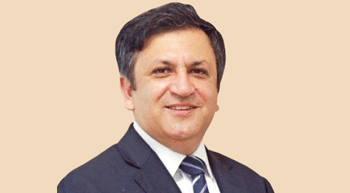
Used equipment without safety standards is a challenge
What is the current CE industry trend from ICEMA perspective?
There is a lot of positivity in the industry though things have not picked up to the extent that we hoped for; what we expected to happen in three months may happen in six months time. We feel that the industry is going to be 10-15 per cent better after six months; and from next year, things will start falling in place.
What are the major challenges you are facing now?
There are challenges from different fronts. One of the major challenges is the delayed start of infrastructure projects. Another area is taxation that needs to be uniform between the states; and GST is going to help when it will be in place. Till then every state will have its own tax structure. This is not a big challenge, but there is a problem in paying high price in terms of different tax structures. Another challenge is used equipment which is not meeting the safety standards. Currently, it is not a major issue since the demand is less. However, the government and ICEMA are taking care of this issue by setting up a test centre where we can test our machine for various standards.
What is ICEMA doing for adoption of technology?
Every company has got its own technology. We are facilitating the process through conferences and seminars, talking about the technology.
What about the technologies already developed which are not specified in the tendering process?
ICEMA is a neutral agency and we at ICEMA don?t interfere with individual company?s technology areas. We are facilitators; what the government should do for the industry as a whole, and what the help we can give to the government for the betterment of the industry. For example, the government suggested some help on setting up a test centre and we provided the support. Now industry needs skill centre and that is why we made Industrial Equipment Sector Council (IESC) and we have also appointed a CEO for that. All ICEMA members have given financial support for the same and will be doing their bit for the success of skill centres.
What are the steps ICEMA has initiated to enhance safety?
We want all the manufacturers to come up with a plan for safety and the test facility which is being set up with the Department of Heavy Industries is going to help us a lot. We can also advise the government on areas to be taken care. The AT Kearney report which was released at Excon 2013 has focused various safety aspects being used across the world. The same report is given to the government with a strong suggestion that we also need to have such stringent safety parameters here in India.
Similarly for emission, which is now already Bharat stage III, and the government is moving towards the next stage. The government is already taking the emission related issues proactively and we can assist wherever we can and we will continue to do that.
Do you think that the Union Budget will be an enabler for the CE sector?
From a budget perspective, we expect there will be some big ticket items in the announcements. Currently, there is positivity in the system and since this is a majority government it can take firm decisions. In the facilitation part, there are issues such as environmental and land clearances for various projects. The government has already announced many projects. If they prioritise at least 20-30 per cent of these projects as of national importance, they are going to ensure from the beginning that these projects are going to be completed in time. Once these projects start with the necessary clearances, other projects also will learn how to get clearances and start the work. So firstly, the government needs to look at the projects which can start without any further delay and quickly do it.
But what is your take on the stalled projects?
Take out all the stalled projects and start with the easier projects to start with national importance and clear all the hurdles first. Government should ensure that it facilitates everything to start and complete the projects. The projects announced by the government cannot be necessarily fresh projects. In certain cases, there would have some projects which are 25 per cent completed, and got stalled because of various reasons. Find out the reasons and if there is an opportunity to get those projects completed, then go ahead. Ensure that contractors are paid. It will be great goodwill that the contractors with their employees and machines are paid. Everything in the system is paid. Then people will get the confidence to do projects and public-private partnership will work.
However, that part is not happening
That is where the facilitation part comes in. It will take time. Things won?t change overnight. If the facilitation happens step by step, which the government is trying very hard to do, I am very positive that it is going to happen. It may take three to six months.
There seems to be no parity in tax structure of a machine manufactured here and the one imported. What is your take on this?
In some cases, the duty structure of the important machines is better. Department of Heavy Industries has actively involved looking at such low duty imports. This will negatively impact the local manufacturers. I think the Department of Heavy Industries has given the proposal and worked with the industry to ensure that everything is at parity. And if at all the manufacturers are not getting any advantage, there should not be any disadvantage. Those actions are already taken recently which have to come into the budget.


 +91-22-24193000
+91-22-24193000 Subscriber@ASAPPinfoGlobal.com
Subscriber@ASAPPinfoGlobal.com